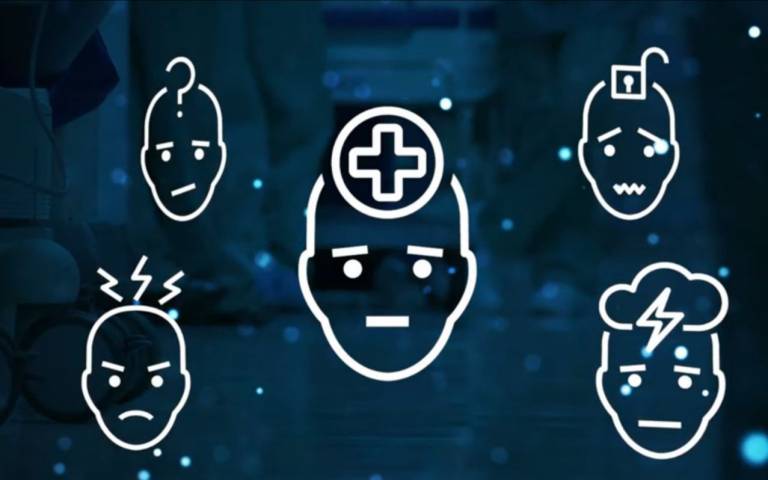Helping healthcare workers to cope with stress
7 April 2020
A group of mental health experts, led by UCL, have issued advice for frontline healthcare workers on how to cope with stress during the COVID-19 crisis.

The advice, launched today in a video, has been issued alongside new guidelines for people in the health sector who are managing responses to stress experienced by hospital staff, covering what is known and not about the psychological effects of COVID-19 on healthcare workers.
The materials have been developed by the COVID Trauma Response Working Group, which comprises psychological trauma specialists, coordinators of psychosocial responses to trauma, and NHS wellbeing leads, and is coordinated by staff at UCL and the Traumatic Stress Clinic at Camden and Islington NHS Foundation Trust. The group has been formed to help coordinate trauma-informed responses to the COVID-19 outbreak.
Dr Michael Bloomfield (UCL Psychiatry and Camden and Islington NHS Foundation Trust), an academic and consultant psychiatrist who convened the group, said: “Health professionals across the world are doing really important and difficult work, and it’s only to be expected that many understandably will feel anxious, stressed, overwhelmed, guilty, helpless, angry or even numb.”
“We’re very concerned about the health and well-being of our frontline colleagues in the NHS and all over the world. We know that they are facing many stresses including concerns about their own safety at work. We want them to know that they are not alone. It’s normal and healthy to seek support from colleagues, friends, family, or other people they trust. It’s responsible, not selfish, to look after yourself.”
The members of the working group point to evidence from previous epidemics suggesting up to one third of frontline healthcare works will experience high levels of distress.
The tips for health care workers include:
- Give yourself permission to take regular breaks during your shifts
- Eat, drink and sleep as well as you can
- Try to use strategies that have helped you cope with stressful situations in the past
- Take time out between shifts
- Stay in touch with friends and family – video and phone call them if you can’t see them in person
- Engage in physical activity
- Maintain a routine as much as possible
- Plan regular activities that make you feel good, and tasks that take your mind off the crisis
- Avoid unhelpful copying strategies such as smoking, alcohol or other drugs
- Try to limit the time spent watching, reading or listening to the news
- Reach out for help if you need support
Dr Dominic Murphy, President of UK Psychological Trauma Society, commented: "This video provides a reminder for all NHS staff of the importance of looking after oneself at such a difficult time. The purpose of the video is to provide examples of evidence-based practices to manage the emotional challenges staff might be facing.”
Dr Nick Grey, Consultant Clinical Psychologist and Clinical Research and Training Fellow, Sussex Partnership NHS Foundation Trust and University of Sussex, added: “Anyone working in health care services will benefit from being reminded of its main messages that a wide range of emotional reactions are understandable, and that there are strategies we can all use for self-care and self-compassion.”
For those who are planning responses and managing people in the NHS, the working group has numerous suggestions such as open communication, rotating workers between more and less stressful roles, encouraging staff to take breaks and role modelling such behaviours by senior staff, and enabling staff to access informal psychological support.
They also caution that healthcare workers should not be given certain types of debriefing including Psychological Debriefing or Critical Incident Stress Debriefing techniques, or any other single session intervention which involves mandating staff to talk about their thoughts or feelings, as there is evidence that these interventions may be ineffective or even increase the likelihood of developing post-traumatic stress disorder.
The King's Fund is summarising the group’s guidance to help leaders support front-line staff. This will be part of the charity's 'Leading through Covid-19' series aimed at providing practical advice for all health and care leaders.
The working group will be incorporating feedback from the video into research they are conducting into what is helpful and unhelpful for staff. They are also developing guidance for patients with COVID-19 who have experienced psychological trauma, and people who are at greater risk of traumatisation because of COVID-19 such as survivors of abuse.
Links
- COVID Trauma Response Working Group
- Guidance for managing a trauma-informed response
- Dr Michael Bloomfield’s academic profile
- UCL Psychiatry
- UCL Institute of Mental Health
- Media coverage
Media contact
Chris Lane
Tel: +44 (0)20 7679 9222
Email: chris.lane [at] ucl.ac.uk
 Close
Close

